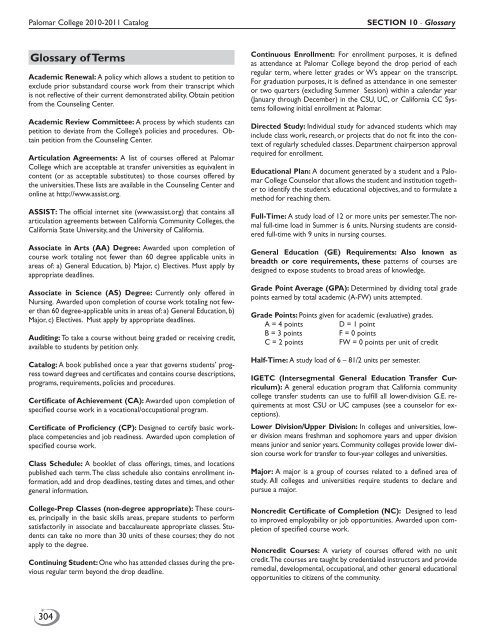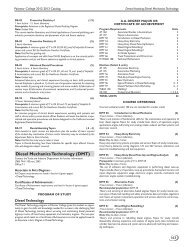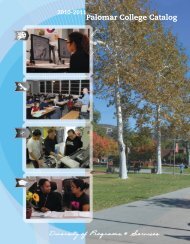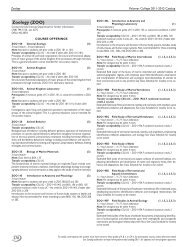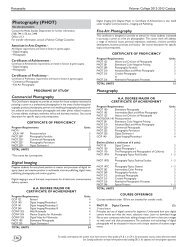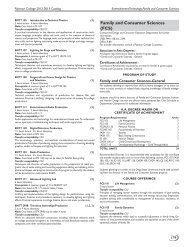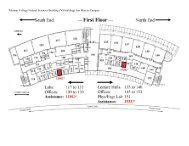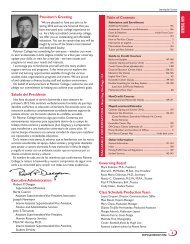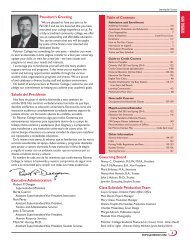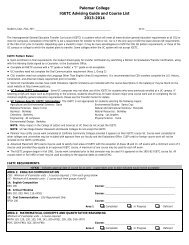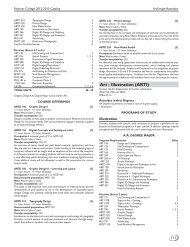Download the complete catalog - Palomar College
Download the complete catalog - Palomar College
Download the complete catalog - Palomar College
Create successful ePaper yourself
Turn your PDF publications into a flip-book with our unique Google optimized e-Paper software.
<strong>Palomar</strong> <strong>College</strong> 2010-2011 Catalog<br />
Section 10 - Glossary<br />
Glossary of Terms<br />
Academic Renewal: A policy which allows a student to petition to<br />
exclude prior substandard course work from <strong>the</strong>ir transcript which<br />
is not reflective of <strong>the</strong>ir current demonstrated ability. Obtain petition<br />
from <strong>the</strong> Counseling Center.<br />
Academic Review Committee: A process by which students can<br />
petition to deviate from <strong>the</strong> <strong>College</strong>’s policies and procedures. Obtain<br />
petition from <strong>the</strong> Counseling Center.<br />
Articulation Agreements: A list of courses offered at <strong>Palomar</strong><br />
<strong>College</strong> which are acceptable at transfer universities as equivalent in<br />
content (or as acceptable substitutes) to those courses offered by<br />
<strong>the</strong> universities. These lists are available in <strong>the</strong> Counseling Center and<br />
online at http://www.assist.org.<br />
ASSIST: The official internet site (www.assist.org) that contains all<br />
articulation agreements between California Community <strong>College</strong>s, <strong>the</strong><br />
California State University, and <strong>the</strong> University of California.<br />
Associate in Arts (AA) Degree: Awarded upon completion of<br />
course work totaling not fewer than 60 degree applicable units in<br />
areas of: a) General Education, b) Major, c) Electives. Must apply by<br />
appropriate deadlines.<br />
Associate in Science (AS) Degree: Currently only offered in<br />
Nursing. Awarded upon completion of course work totaling not fewer<br />
than 60 degree-applicable units in areas of: a) General Education, b)<br />
Major, c) Electives. Must apply by appropriate deadlines.<br />
Auditing: To take a course without being graded or receiving credit,<br />
available to students by petition only.<br />
Catalog: A book published once a year that governs students’ progress<br />
toward degrees and certificates and contains course descriptions,<br />
programs, requirements, policies and procedures.<br />
Certificate of Achievement (CA): Awarded upon completion of<br />
specified course work in a vocational/occupational program.<br />
Certificate of Proficiency (CP): Designed to certify basic workplace<br />
competencies and job readiness. Awarded upon completion of<br />
specified course work.<br />
Class Schedule: A booklet of class offerings, times, and locations<br />
published each term. The class schedule also contains enrollment information,<br />
add and drop deadlines, testing dates and times, and o<strong>the</strong>r<br />
general information.<br />
<strong>College</strong>-Prep Classes (non-degree appropriate): These courses,<br />
principally in <strong>the</strong> basic skills areas, prepare students to perform<br />
satisfactorily in associate and baccalaureate appropriate classes. Students<br />
can take no more than 30 units of <strong>the</strong>se courses; <strong>the</strong>y do not<br />
apply to <strong>the</strong> degree.<br />
Continuing Student: One who has attended classes during <strong>the</strong> previous<br />
regular term beyond <strong>the</strong> drop deadline.<br />
Continuous Enrollment: For enrollment purposes, it is defined<br />
as attendance at <strong>Palomar</strong> <strong>College</strong> beyond <strong>the</strong> drop period of each<br />
regular term, where letter grades or W’s appear on <strong>the</strong> transcript.<br />
For graduation purposes, it is defined as attendance in one semester<br />
or two quarters (excluding Summer Session) within a calendar year<br />
(January through December) in <strong>the</strong> CSU, UC, or California CC Systems<br />
following initial enrollment at <strong>Palomar</strong>.<br />
Directed Study: Individual study for advanced students which may<br />
include class work, research, or projects that do not fit into <strong>the</strong> context<br />
of regularly scheduled classes. Department chairperson approval<br />
required for enrollment.<br />
Educational Plan: A document generated by a student and a <strong>Palomar</strong><br />
<strong>College</strong> Counselor that allows <strong>the</strong> student and institution toge<strong>the</strong>r<br />
to identify <strong>the</strong> student’s educational objectives, and to formulate a<br />
method for reaching <strong>the</strong>m.<br />
Full-Time: A study load of 12 or more units per semester. The normal<br />
full-time load in Summer is 6 units. Nursing students are considered<br />
full-time with 9 units in nursing courses.<br />
General Education (GE) Requirements: Also known as<br />
breadth or core requirements, <strong>the</strong>se patterns of courses are<br />
designed to expose students to broad areas of knowledge.<br />
Grade Point Average (GPA): Determined by dividing total grade<br />
points earned by total academic (A-FW) units attempted.<br />
Grade Points: Points given for academic (evaluative) grades.<br />
A = 4 points D = 1 point<br />
B = 3 points<br />
F = 0 points<br />
C = 2 points FW = 0 points per unit of credit<br />
Half-Time: A study load of 6 – 81/2 units per semester.<br />
IGETC (Intersegmental General Education Transfer Curriculum):<br />
A general education program that California community<br />
college transfer students can use to fulfill all lower-division G.E. requirements<br />
at most CSU or UC campuses (see a counselor for exceptions).<br />
Lower Division/Upper Division: In colleges and universities, lower<br />
division means freshman and sophomore years and upper division<br />
means junior and senior years. Community colleges provide lower division<br />
course work for transfer to four-year colleges and universities.<br />
Major: A major is a group of courses related to a defined area of<br />
study. All colleges and universities require students to declare and<br />
pursue a major.<br />
Noncredit Certificate of Completion (NC): Designed to lead<br />
to improved employability or job opportunities. Awarded upon completion<br />
of specified course work.<br />
Noncredit Courses: A variety of courses offered with no unit<br />
credit. The courses are taught by credentialed instructors and provide<br />
remedial, developmental, occupational, and o<strong>the</strong>r general educational<br />
opportunities to citizens of <strong>the</strong> community.<br />
304


